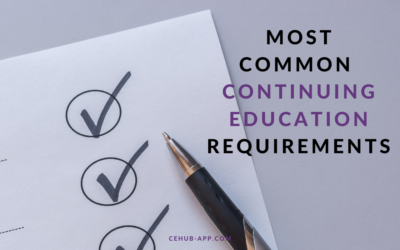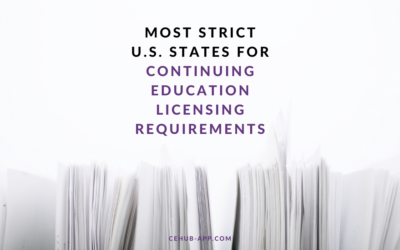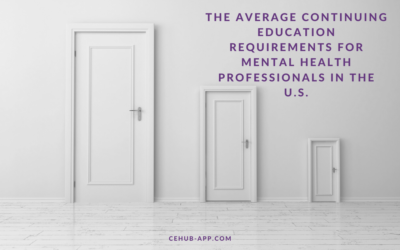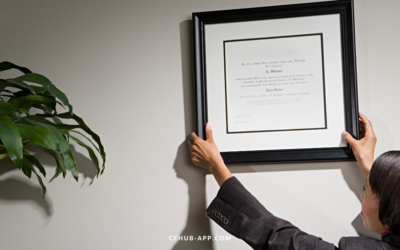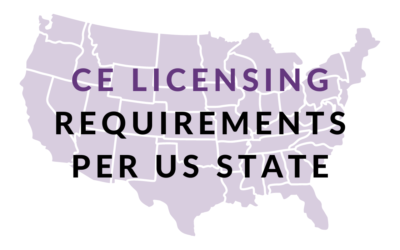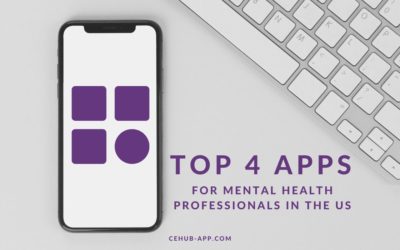As a licensed psychologist in the state of North Carolina, it is your responsibility to adhere to continuing education requirements every period in order to renew your license. Beyond license renewal being key to you maintaining your practice, continuing education is essential to stay abreast of what is happening in psychology – something your clients will always appreciate you taking seriously. Education is how we all continue to learn and further hone our skills and expertise, so it’s certainly something to be celebrated. Though education is fantastic, keeping on track with the many hours you need to fulfill can be a challenge. Thankfully, there is a fantastic resource available to help you with that. Before we dive into the resource, let’s start by outlining what is required of North Carolina psychologist in order to renew their license each year.
Licensee Requirements for North Carolina Psychologists
Beginning the October 1, 2022 licensing cycle, proof of continuing education will be required in order for North Carolina psychologists to renew their license to practice. Licensees are required to complete 24 hours of continuing education every two years before the September 30 expiration date. Within the 24 hours required, at least 15 of the hours need to be obtained through “Category A” continuing education, which is any activity that meets all of the requirements listed in bullets 1-5 here. The remaining nine hours can be completed through either “Category A” or “Category B” activities. “Category B” activities include any activity that covers the topic areas listed in bullet 3 at the link shared previously.
As a final requirement, three of the 15 hours completed via “Category A” activities need to be specifically on the topic of professional ethics in psychology practice. Note that the word “ethics” (or a derivative of it) must be included in the title of the course, in order for the course to be accepted.
Key Takeaways:
- North Carolina psychologists must complete 24 hours of continuing education every two years
- There is a new requirement that proof of completion is to be submitted as of the 2022 cycle
- 15 of the 24 hours must be “Category A” activities, with the remaining nine Category A or B.
Given psychologists are likely to achieve their continuing education certificates in increments, from various workshops, conventions, agencies, and institutions, there is a lot of documentation to keep track of (potentially 24 or more certificates throughout the course of the two-year time period). As proof is required when you apply for renewal, it’s imperative you keep all of those certificates in a safe place – easily accessible and easy to track your progress. CE Hub is the safe place you need to work through your continuing education with ease.
What is CE Hub?
CE Hub is an app built specifically for psychologists. Recognizing the difficulty that is storing continuing education certificates and keeping track of your hours, CE Hub was created to take the stress out of continuing education requirements. Instead of worrying throughout the period that you may not be on track, or perhaps that you may have lost a document or two, CE Hub provides you the peace of mind you need to enjoy the learning process. Using the platform is simple: you sign up, upload your continuing education certificates as you obtain them, then CE Hub handles the rest. All of your continuing education credits are tracked for you, and you even receive a reminder when it’s time to renew your license. Alleviate the stress of continuing education requirements by taking advantage of CE Hub today!
Disclaimer: this content is for informational purposes only. Licensees should always confirm their continuing education requirements with their respective governing agency. In the state of North Carolina, psychologists can clarify anything about their license by contacting the North Carolina Psychology Board via email at info@ncpsychologyboard.org.
Reference Links:
https://www.ncpsychologyboard.org/continuing-education/https://www.ncpsychologyboard.org/Office/pdfiles/CE-ReferenceGuide-2021-07-24.pdf


